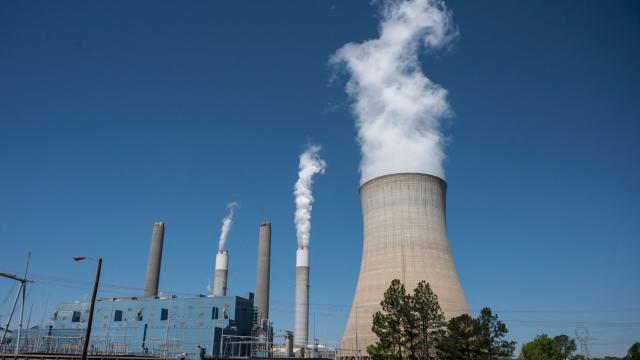On Monday, the nation’s largest union of coal miners announced that it’s down for the shift to renewable energy as long the transition includes aid — and new jobs — for workers laid off from their sector. It’s the latest sign that workers aren’t buying the fossil fuel industry’s narrative that it’s a great protector of U.S. jobs.
“As we confront a next wave of energy transition, we must take steps now to ensure that things do not get worse for coal miners, their families and communities, but in fact get better,” Cecil E. Roberts, international president of the United Mine Workers of America, said in a statement.
At a press conference, union officials also unveiled a plan for “preserving coal country” as the world transitions to clean energy. They stood beside Sen. Joe Manchin, a Democrat from West Virginia, who endorsed their demands for the move to clean energy, marking a sharp turn from his history of defending the coal industry at all costs. (Manchin infamously once shot a bullet through a copy of a major Congressional climate bill in a political ad.) At the press event, Manchin also backed the PRO Act, a transformative bill to increase labour protections.
The announcement flies in the face of the jobs vs. environment argument that extractive industry and its allies have pushed for decades as a way to claim that climate regulations must be avoided at all costs. In truth, of course, the sector has been laying off workers all on its own without any new environmental regulations.
In 2020, fossil fuel companies eliminated more than 100,000 positions, some 70% of which aren’t likely to come back. That included 7,000 jobs in the coal sector, which may not seem like much but constituted nearly 9% of the industry’s workforce. Of course, these layoffs came while the firms continued to pay shareholders fortunes and received billions in federal bailouts.
This wasn’t an aberration, either, but an acceleration of a pre-existing trend toward layoffs in the industry. That’s especially true for the coal industry, which has faced a decline in demand due to cheap natural gas and renewable energy sources for decades in the U.S. The sector laid off 24% of its workforce between 2017 and 2020. As of December 2020, the new UMWA plan says the coal industry employed just 44,000 people.
In a desperate attempt to hang onto its business model, the industry has doubled down on pretending it’s on workers’ side despite obvious evidence to the contrary, and politicians have been happy to carry their water. UMWA’s announcement on Monday shows that workers are no longer buying that company line and understand the need to wind down the industry to avert catastrophic levels of climate change. The support of Manchin, a crucial vote for Democrats’ razor-thin majority in the Senate, is a signal that organisers’ pressure may be having an effect in garnering federal protections amid the currently unmanaged decline.
“Much of the coal-producing areas of Appalachia and elsewhere are already in bad economic shape,” Roberts said. “Washington has taken little action to address it over the past decade. That must change. And as we confront a next wave of energy transition, we must take steps now to ensure that things do not get worse for coal miners, their families, and communities, but in fact get better.”
There’s much debate to be had about what exactly those steps should entail. For instance, in addition to calling for new jobs in renewable energy and financial support for former miners, the union called for more funding for clean coal technology, yet there’s no evidence to support that these clean coal schemes are actually clean since they still produce large amounts of toxic and planet-warming pollution. UMWA also called for spending on developing carbon capture and storage technology, which would allow coal plants to store the carbon emissions they produce and thereby allow the plants to remain operational since they’ve theoretically eliminated their climate impact. But these technologies do nothing about the local impacts of pollution like air pollution which disproportionately affects coal miners, and have not been proven to work at scale. Banking on them to save the industry is a huge risk.
That there are some large nits to pick doesn’t mean the proposal should be thrown out. Rather, it shows the importance of having honest and open discussions with rank and file workers and giving them a front and centre role in negotiating just transition plans. And the thrust of the union’s argument, that worker protections must be at the centre of the transition away from fossil fuels, is crucial.
“Change is coming, whether we seek it or not. Too many inside and outside the coalfields have looked the other way when it comes to recognising and addressing specifically what that change must be, but we can look away no longer,” the proposal says. “We must act, while acting in a way that has real, positive impact on the people who are most affected by this change.”
